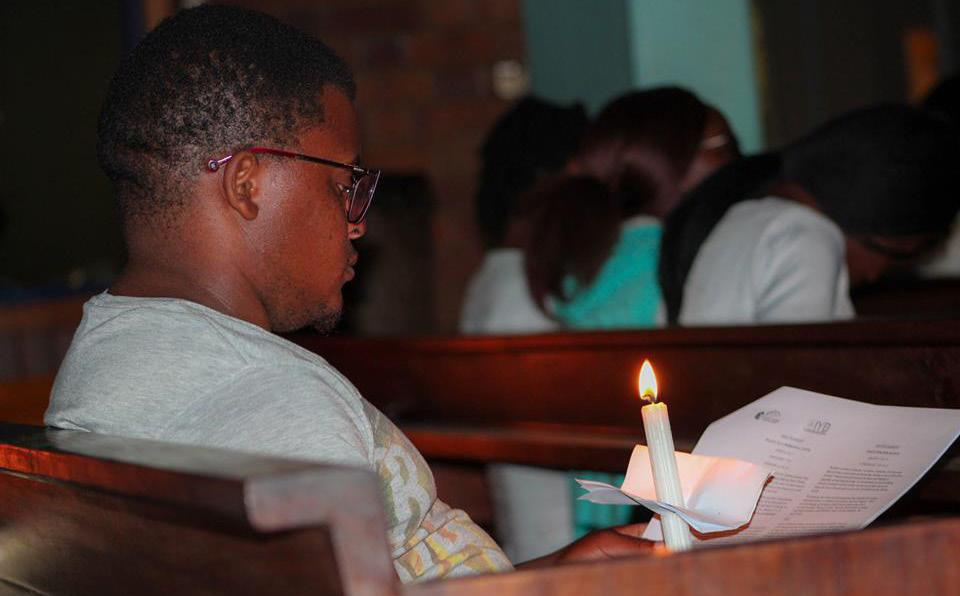
5 minute read
God’s Mercy: The Ultimate Spiritual Sanitizer
The hope of humanity is in God who in his mercy sanitizes the world

Advertisement
mystery of Christ can only be a solution to these. St John Paul II expresses it well when he asserts that, “The cross is the most profound condescension of God to man and to what man - especially in difficult and painful moments - looks on as his unhappy destiny. The cross is like a touch of eternal love upon the most painful wounds of man’s earthly existence…” (Dives in Misericordia 82). This, therefore, is an eye opener to all nations that instead of blaming one another, cooperation is required so that the world recognises its healing by God who is rich in mercy. There is need to imitate God in his mercy. Eleos depicts God’s gracious loyalty to his covenant promises. It denotes an attitude arising out of mutual relationships like a covenant relationship (R. Bultmann 1967, 222). Mercy is an act rather than a disposition; it intrinsically has an element of obligation and includes grace particularly on the part of God. This means that God has freely bound himself to his people. God’s mercy is his faithfulness and love for his people. Mercy is an act or expression of love. Governments, as the guardians of nations, have to adopt the same attitude of faithfulness to the oath to serve people through justice, respect of human rights and dignity, transparency and accountability. An experience of God’s mercy leads to faithful and selfless service. It is a commendable act for a government to fulfill its duties including establishing quarantine centres for returning citizens from the diaspora, but it is another thing to ensure that those centres are well furnished for the temporary inhabitants. In the same vein it is a civil duty and an act of mercy towards others in the society for those in the quarantine centres not to abscond. The donations given towards Covid-19 victims can be regarded as a corporate expression mercy. Individuals and companies that give donations and spread awareness about the virus especially to the elderly, the mentally handicapped, children and those deprived of sources of information do practice acts of mercy. While the charity of the business community and other countries towards the Zimbabwe government is commendable, and while corruption in relation to the donations must be condemned, the countries that have enjoined economic sanctions against Zimbabwe should desist from such cruelty expressed through these measures. In light of these present circumstances, “international sanctions have to be removed because they make it difficult for the nation to provide adequate support for its citizens” (Pope Francis Urbi et Orbi 27 March 2020). This has affected the health service delivery in Zimbabwe. Mercy is the content of intimacy with the Lord, the content of dialogue with Him (Dives in Misericordia 33).
In a nutshell, although the world is in a mess, there are springs of God’s infinite mercy that can sanitize the world. Covid-19’s imposition of the so-called ‘new normal’ is an opportunity to bring humanity to greater charity and mercy towards one another, because in general we all love life. Only God, the source of every good, even though he is unrecognised by some, inspires persons to give alms, to work in quarantine centres, hospitals, old people’s homes and prisons. The hope of humanity is in God who in his mercy sanitizes the world. The constantly spoken about market forces and the economy do not supersede God and the importance of the good.
The Universal Apostolic Preferences in a Time of Corona
Fr Roland Von Nidda SJ Spiritual Father - Arrupe Jesuit University Harare
INTRODUCTION After a sixteen-month discernment process throughout the Society of Jesus, Fr. Arturo Sosa (the Superior General) on 19th February 2019 announced, with the approval of Pope Francis, four Universal Apostolic Preferences (UAP’s), to which Jesuits and their partners will commit themselves for the next ten years.

They are:
1.IGNATIAN DISCERNMENT:
To show the way to God through the Spiritual Exercises and discernment;
2.THE POOR: To walk with the poor, the outcasts of the world, those whose dignity has been violated, in a mission of reconciliation and justice
3.YOUTH: To accompany young people in the creation of a hope-filled future;
4.THE ENVIRONMENT: To collaborate in the care of our Common Home. The corona pandemic, and its consequent lockdowns, have highlighted the importance of these UAP’s, and posed new questions and challenges, but also opportunities, for them. Here I want briefly to explore what some of these might be. I will focus principally on the first, since I believe that the others flow from it.
FIRST UAP. IGNATIAN SPIRITUALITY AND DISCERNEMENT.
Why is this UAP so important in the present time, and how does it help us? Ignatian discernment is about discovering the will of God, and doing it, because it brings us joy and consolation, and is always the objectively right thing to do for the good of others. This is particularly relevant today in a world riven by confusion, division, and suffering, enhanced by Covid-19. People are hurting, not just financially from loss of jobs and income, but psychologically, because of the stress these losses incur, and spiritually, as people struggle to make sense of what is happening and why it is happening. This is made clear by the questions one hears Christians asking at this difficult time. To give a sample of some of those I hear:










